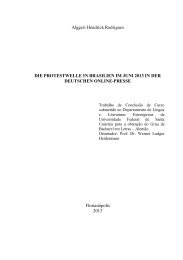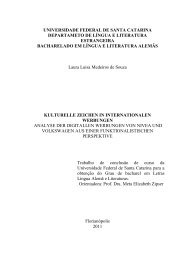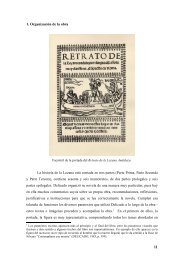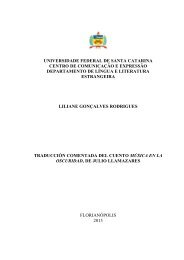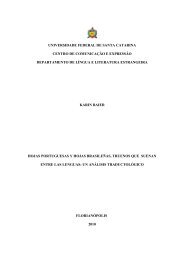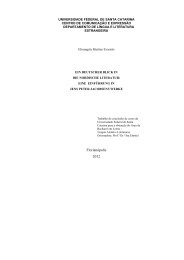TCC - Marcia Regina Barreto Moraes - Departamento de Língua e ...
TCC - Marcia Regina Barreto Moraes - Departamento de Língua e ...
TCC - Marcia Regina Barreto Moraes - Departamento de Língua e ...
You also want an ePaper? Increase the reach of your titles
YUMPU automatically turns print PDFs into web optimized ePapers that Google loves.
utterance” and “speaking individual”. The poet has “hegemony over his own language”. 31<br />
But other concepts like heteroglossia and foreign language are not completely out of the<br />
poetic language. However, these “possibilities are limited” 32 , especially because the<br />
concentrated efforts of a poet refer to his own language.<br />
Therefore, the poet crafts words in or<strong>de</strong>r to create a poetic effect, which is their<br />
own concept of language and world. Bakhtin 33 reiterates “the poet’s meaning” as “a single<br />
intentional whole”. According to this theory, the poet’s use of “the word of others’<br />
intentions” ceases connections with “concrete intentional levels of language” and with<br />
“specific contexts”.<br />
In Map of Dreams, there are these two excerpts of sirens 34 , part women and part<br />
birds, that the language used <strong>de</strong>monstrates how the previous mentioned myths serve the<br />
poet’s intentions. The persuasive creatures have a supporting role in the sea travel. It is<br />
possible to verify their moves in “No sooner had we left” and “What was left us then”.<br />
In the former, the sailors were lost and the captain, rum-drunk. They had no alternatives.<br />
Once the captain <strong>de</strong>stroyed the charts, sirens, in a certain way, put their gifts in practices<br />
suggesting (chanting) that seafaring men forgot their nautical instruments:<br />
something from the sirens,<br />
Sail by power of dreams,<br />
they crooned, by ignoring maps,<br />
by letting the helm go.<br />
31 I<strong>de</strong>m (297).<br />
32 I<strong>de</strong>m (287).<br />
33 I<strong>de</strong>m (297).<br />
34 As persuasive beings, sirens are associated with <strong>de</strong>ath. The Cambridge dictionary at the website<br />
http://dictionary.cambridge.org/dictionary/ <strong>de</strong>fines siren as “(in ancient Greek literature) one of the creatures who were half woman<br />
and half bird, whose beautiful singing encouraged sailors to sail into dangerous waters where they died”.<br />
19



